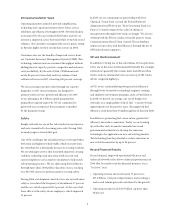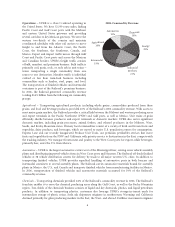Union Pacific 2006 Annual Report Download - page 14
Download and view the complete annual report
Please find page 14 of the 2006 Union Pacific annual report below. You can navigate through the pages in the report by either clicking on the pages listed below, or by using the keyword search tool below to find specific information within the annual report.We Rely on Technology and Technology Improvements in Our Business Operations – We rely on information
technology in all aspects of our business. If we do not have sufficient capital to acquire new technology or if we are
unable to implement new technology, we may suffer a competitive disadvantage within the rail industry and with
companies providing other modes of transportation service, which could have a material adverse effect on our
results of operations, financial condition, and liquidity. Additionally, if we experience significant disruption or
failure of one or more of our information technology systems, including computer hardware, software, and
communications equipment, we could experience a service interruption, safety failure, security breach, or other
operational difficulties, which could have a material adverse impact on our results of operations, financial
condition, and liquidity.
We Are Subject to Significant Environmental Laws and Regulations – Our operations are subject to extensive
federal, state, and local environmental laws and regulations concerning, among other things, emissions to the air;
discharges to waters; handling, storage, transportation, and disposal of waste and other materials; and hazardous
material or petroleum releases. We generate and transport hazardous and non-hazardous waste in our operations,
and we did so in our former operations. Environmental liability can extend to previously owned or operated
properties, leased properties, and properties owned by third parties, as well as to properties we currently own.
Environmental liabilities have arisen and may also arise from claims asserted by adjacent landowners or other
third parties in toxic tort litigation. We have been and may be subject to allegations or findings that we have
violated, or are strictly liable under, these laws or regulations. We could incur significant costs as a result of any of
the foregoing, and we may be required to incur significant expenses to investigate and remediate known,
unknown, or future environmental contamination, which could have a material adverse effect on our results of
operations, financial condition, and liquidity.
Rising or Elevated Fuel Costs and Whether We Are Able to Mitigate These Costs with Fuel Surcharges Could
Materially and Adversely Affect Our Business – Fuel costs constitute a significant portion of our transportation
expenses. Diesel fuel prices are subject to dramatic fluctuations, and significant price increases could have a
material adverse effect on our operating results. Although we currently are able to recover a significant amount of
our increased fuel expenses through revenue from fuel surcharges, we cannot be certain that we will always be able
to mitigate rising or elevated fuel costs through surcharges. Future market conditions or legislative or regulatory
activities could adversely affect our ability to apply fuel surcharges or adequately recover increased fuel costs
through fuel surcharges. International, political, and economic circumstances affect fuel prices and supplies.
Weather can also affect fuel supplies and limit domestic refining capacity. If a fuel supply shortage were to arise
from OPEC production curtailments, a disruption of oil imports, or other causes, higher fuel prices could, despite
our fuel surcharge programs, have a material adverse effect on our results of operations, financial condition, and
liquidity.
We Face Competition from Other Railroads and Other Transportation Providers – We face competition from other
railroads, motor carriers and, to a lesser extent, ships, barges, and pipelines. In addition to price competition, we
face competition with respect to transit times and quality and reliability of service. While we must build or acquire
and maintain our rail system, trucks and barges are able to use public rights-of-way maintained by public entities.
Any future improvements or expenditures materially increasing the quality or reducing the cost of alternative
modes of transportation, or legislation releasing motor carriers from their size or weight limitations, could have a
material adverse effect on our results of operations, financial condition, and liquidity. Additionally, any future
consolidation of the rail industry could materially affect the competitive environment in which we operate.
We May Be Affected by General Economic Conditions – Prolonged negative changes in domestic and global
economic conditions affecting the producers and consumers of the commodities carried by us may have a
material adverse effect on our results of operations, financial condition, and liquidity.
We Utilize Capital Markets – We rely on the capital markets to provide some of our capital requirements,
including the issuance of commercial paper from time to time and the sale of certain of our receivables. Market
instability or deterioration of our financial condition due to internal or external factors could restrict or prohibit
8
























